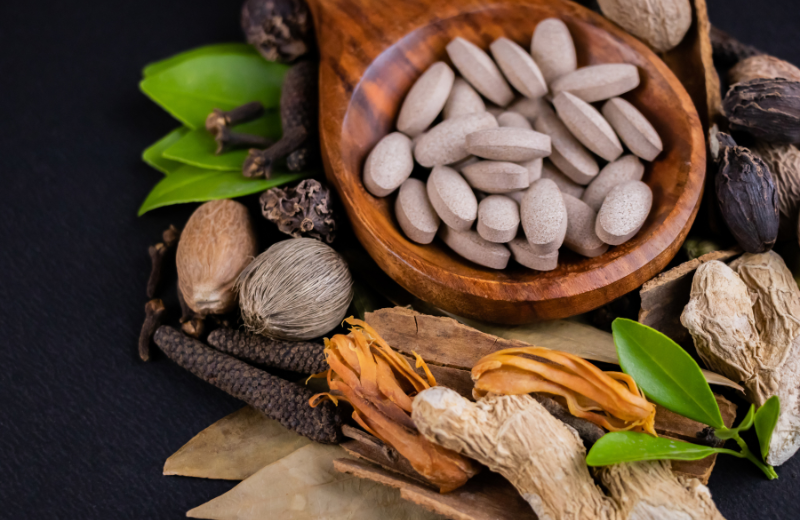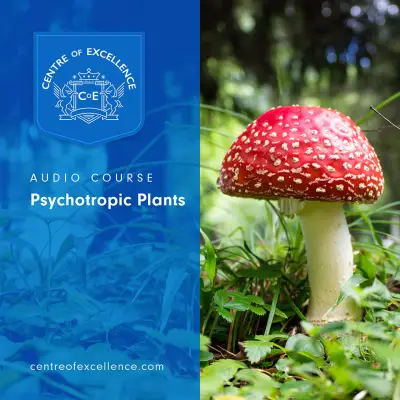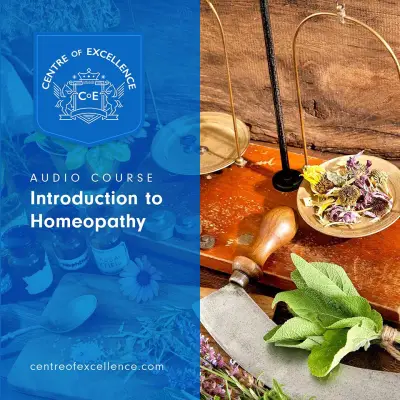Lemon balm is a calming herb that serves as a natural remedy for skin care, digestion, and sleep. This fragrant plant has been treasured for centuries, offering a range of uses from soothing teas to herbal tinctures. In this guide, you’ll discover the many lemon balm plant benefits, how to use it safely, and what to watch out for.
This article is for informational purposes only and is not a substitute for professional medical advice, diagnosis, or treatment. Always consult with your GP or a qualified healthcare professional before starting any new herbal remedies, especially if you are pregnant, breastfeeding, taking medication, or managing a health condition.
Jump to
- What is Lemon Balm?
- The Benefits of Lemon Balm
- What Types of Lemon Balm Can You Take?
- How Much Lemon Balm Should You Take, and When?
- What Are the Side Effects of Lemon Balm?
- Who Should Avoid Lemon Balm?
- Is Lemon Balm Safe for Long-Term Use?
- Other Common Questions About Lemon Balm
- Study Our Herbalism Diploma for £29
Recommended for you!
Best SellersWhat is Lemon Balm?
The lemon balm plant (Melissa officinalis) is a member of the mint family, known for its fresh, lemony scent. Native to Europe, North Africa, and West Asia, it has long been celebrated for its medicinal uses and culinary charm. But what is lemon balm best used for today?
Traditionally, lemon balm has been used to calm the mind, ease digestion, and support skin health. Its gentle nature makes it popular in teas, tinctures, oils, and extracts. You might be surprised to know that you can even eat lemon balm leaves raw, adding a citrusy twist to salads and desserts.
The Benefits of Lemon Balm

There’s a growing interest in natural remedies, and the list of lemon balm’s health benefits is truly impressive. Both science and tradition highlight how this versatile herb can support your wellbeing in a variety of ways.
1. Calming the Mind and Easing Anxiety
Lemon balm is widely recognised for its gentle calming properties. Many people turn to this herb to help soothe a racing mind and ease anxiety. Its natural compounds are believed to interact with the brain’s receptors to promote relaxation, reduce restlessness, and support emotional balance.
Whether enjoyed as a warm tea, taken as a tincture, or used in extract form, lemon balm has become a popular choice for those seeking a natural way to manage daily stress and encourage a sense of calm. Its ability to uplift mood without causing drowsiness makes it a supportive companion during challenging times.
2. Better Sleep Naturally
For those who struggle to unwind at the end of the day, lemon balm provides a gentle solution. Known for encouraging restful sleep, it helps relax both the body and mind, making it easier to drift off naturally. Herbalists often recommend lemon balm as part of a bedtime routine, especially when blended with other calming herbs like chamomile or valerian.
Regular use can help improve sleep quality without the grogginess associated with stronger sleep aids, making it ideal for anyone looking to restore a healthy sleep pattern in a natural way.
3. Digestive Comfort
Lemon balm has a long history of use in soothing digestive discomfort. Traditionally, it has been brewed into tea to help ease symptoms such as indigestion, bloating, cramping, and nausea. Its gentle antispasmodic properties help relax the digestive tract, offering relief after heavy meals or during periods of digestive upset.
Incorporating lemon balm into your daily routine, particularly as a post-meal tea, can provide a simple yet effective way to support a more comfortable and balanced digestive system.
4. Skin Support and Healing
Thanks to its antiviral and anti-inflammatory properties, lemon balm is a popular ingredient in skincare remedies. It is especially valued for its role in treating cold sores, where lemon balm oil can help reduce healing time and ease irritation.
Beyond cold sores, lemon balm is used in creams and balms to calm irritated skin, reduce redness, and promote overall skin health. Its soothing nature makes it suitable for sensitive skin, offering a natural alternative to chemical-based treatments.
5. Herpes and Antiviral Benefits
Lemon balm’s antiviral qualities extend beyond general skincare. It has been studied for its effectiveness in managing herpes simplex virus outbreaks. When applied topically as a cream or extract, lemon balm can help reduce the severity and duration of symptoms, such as itching, burning, and swelling.
Regular use during flare-ups may also help to increase the time between outbreaks, providing a natural and gentle way to manage this common condition without relying solely on pharmaceutical treatments.
6. Weight Management
While lemon balm is not a weight-loss remedy on its own, it can play a supportive role in maintaining a healthy lifestyle. Its calming effects may help reduce stress-related eating and emotional food cravings, which are common obstacles in weight management.
Drinking lemon balm tea throughout the day can promote relaxation, helping to balance mood and prevent the tendency to reach for unhealthy snacks during stressful moments. Combined with a balanced diet and regular exercise, lemon balm can encourage healthier habits and support long-term wellbeing.
7. Cognitive and Brain Health
Lemon balm is known to offer benefits for cognitive function and mental clarity. Research suggests that it may help improve focus, concentration, and memory by reducing mental fatigue and enhancing alertness.
This makes it particularly useful during periods of high stress or when sustained attention is needed. By calming the nervous system while simultaneously supporting cognitive performance, lemon balm provides a balanced approach to mental wellbeing, helping you stay clear-headed and composed throughout the day.
8. Hormonal Balance and Menopause Support
Herbalists often recommend lemon balm to support hormonal balance, particularly during menopause. Its calming and mood-stabilising properties can help ease common symptoms such as irritability, anxiety, and sleep disturbances associated with hormonal fluctuations.
Drinking lemon balm tea or using tinctures regularly may offer a natural way to navigate the challenges of menopause, providing gentle relief without the side effects linked to synthetic treatments. It’s also thought to support overall endocrine health, promoting harmony within the body’s hormonal systems.
9. Hair Growth and Beauty
Though research is still developing, lemon balm is sometimes included in natural hair care routines due to its potential to improve scalp health. Its anti-inflammatory and antimicrobial properties may help soothe scalp irritation and create a healthier environment for hair growth.
When used as an herbal rinse or infused in oils, lemon balm can refresh the scalp, reduce dandruff, and add a natural shine to hair. Its broader benefits for skin also extend to promoting a clear, healthy complexion, making it a valuable addition to beauty regimes focused on natural care.
10. Spiritual Healing and Protection
Beyond its physical benefits, lemon balm holds a special place in spiritual and energetic practices. It has long been associated with emotional healing, protection, and attracting positive energy. Many people use lemon balm in rituals or as part of their mindfulness routines to uplift the spirit and promote inner peace.
Traditionally linked to the heart chakra, lemon balm is believed to encourage love, compassion, and emotional balance. Some cultures connect the herb to goddesses like Diana or Artemis, symbolising purity, nature, and protection. Whether used in teas, incense, or baths, lemon balm continues to be valued for its gentle, nurturing energy in both spiritual and holistic practices.
What Types of Lemon Balm Can You Take?

Lemon balm is a versatile herb and is available in several different forms to suit various preferences and lifestyles.
You can choose from teas, tinctures, capsules, powders, oils, extracts, and fresh or dried leaves. Some forms are better suited for relaxation and stress relief, while others are ideal for skincare or digestive support.
What is the best form of Lemon Balm to take?
- Tinctures: A concentrated liquid extract, tinctures are appreciated for their quick absorption and convenience. They can be taken directly under the tongue or added to water, making them ideal for those seeking fast-acting relief from stress or anxiety.
- Capsules or Tablets: Perfect for simplicity and precise dosing. These are tasteless, easy to transport, and ideal if you prefer a straightforward, no-preparation method to enjoy lemon balm's health benefits.
- Tea: A soothing option for those who enjoy herbal routines. Lemon balm tea provides a gentle, calming experience, particularly beneficial in the evening to promote relaxation and improved sleep. While milder in strength, it’s a comforting way to include lemon balm in your daily life.
- Powders: A flexible option for adding to smoothies or recipes. Powders give you control over dosage and are ideal if you like incorporating supplements into your meals.
- Oils: Commonly used for topical applications. Lemon balm oil is particularly valued for skincare, including the treatment of cold sores and soothing irritated skin.
- Fresh or Dried Leaves: These can be used in cooking, salads, or infused in water. You can eat lemon balm leaves raw for a refreshing citrus flavour or brew them into tea.
Regardless of the form you choose, it’s important to select high-quality products made from genuine Melissa officinalis. Always opt for reputable suppliers to ensure purity and potency, so you can enjoy the full range of lemon balm’s medicinal uses.
How Much Lemon Balm Should You Take, and When?
The typical lemon balm dosage ranges from 300mg to 500mg per day when taken as a capsule or tablet, or 1 to 3 ml if using a tincture. For lemon balm tea, steeping 1 to 2 teaspoons of dried leaves in hot water up to three times daily is common. It’s best to start with a lower dose and adjust as needed, always following product guidelines.
Since lemon balm has calming and mildly sedative effects, it’s generally recommended to take it in the evening if you're using it to support sleep or relaxation. For daytime use, such as easing stress or supporting digestion, smaller doses can be taken throughout the day. For best results, take it consistently, around 30 minutes before bedtime for sleep, or before meals for digestive support. If using long-term, consider short breaks to maintain its effectiveness.
What Are the Side Effects of Lemon Balm?

Common side effects of lemon balm are usually mild and short-lived. Most people tolerate lemon balm well, but some may experience:
- Drowsiness or feeling overly relaxed
- Dizziness or light-headedness
- Nausea or mild digestive discomfort
- Allergic reactions, such as skin irritation (particularly with topical use)
- Headaches in rare cases
There is some evidence to suggest that lemon balm may affect thyroid function. This is why people with thyroid disorders should be cautious..
If you are pregnant, breastfeeding, or taking medications for anxiety, sleep disorders, or thyroid conditions, it’s important to consult a healthcare professional before using lemon balm in any form.
Who Should Avoid Lemon Balm?
People with thyroid issues, such as hypothyroidism, should avoid using lemon balm unless advised by a healthcare professional. Additionally, those taking sedatives or medications that affect mood or sleep should use caution, as lemon balm may enhance the effects of these drugs. If you have known allergies to plants in the mint family, it’s best to steer clear.
Is Lemon Balm Safe for Long-Term Use?
While short-term use of lemon balm is generally considered safe, the long-term effects are not fully understood. It’s often recommended to take periodic breaks if using lemon balm regularly, to maintain its effectiveness and reduce any potential risks.
Recommended for you!
Best SellersOther Common Questions About Lemon Balm
- Does lemon balm cause weight gain? Lemon balm is more commonly associated with promoting relaxation, which may help reduce stress-related eating. It does not contribute directly to weight gain. In fact, its calming properties can support healthier lifestyle habits.
- Is lemon balm anti-inflammatory? Lemon balm has mild anti-inflammatory and antiviral properties. These qualities make it useful in skincare products and for soothing digestive discomfort. It’s a gentle option for supporting overall wellness.
- Does lemon balm help with hair growth or skin health? Lemon balm may promote scalp and skin health due to its soothing, antimicrobial, and anti-inflammatory properties. It is often used in natural skincare and haircare routines. While research is limited, it can support a healthier environment for hair and skin.
- Which is better, lemongrass or lemon balm? Lemongrass is primarily used in cooking for its citrus flavour, while lemon balm is valued for its calming and medicinal benefits. They serve different purposes in both culinary and wellness contexts. Lemon balm is typically chosen for relaxation and herbal remedies.
- Is lemon balm safe for the liver, and is lemon balm bad for your heart? There’s no strong evidence suggesting that lemon balm harms the liver or heart in healthy individuals. However, those with existing liver or heart conditions should seek medical advice before using it regularly. Moderate, responsible use is generally considered safe.
- Can lemon balm raise blood pressure? Lemon balm is more likely to have a mild lowering effect on blood pressure due to its calming nature. It supports relaxation, which can help ease tension in the body. Those with low blood pressure should still monitor their response.
- What can you mix with lemon balm tea? Honey, chamomile, or peppermint are excellent additions to lemon balm tea. These ingredients enhance the flavour and can boost the calming and digestive benefits. Experimenting with blends can make your tea experience more enjoyable.
- Can you drink lemon balm in water? Fresh lemon balm leaves can be infused in cold water for a refreshing herbal drink. This is a simple way to enjoy its light, citrusy flavour throughout the day. It’s also a great caffeine-free alternative to sugary beverages.
Study Our Herbalism Diploma for £29
If you’ve found yourself fascinated by the potential of Lemon balm and other natural remedies, why not deepen your understanding? Whether you're a beginner or looking to expand your knowledge, Centre of Excellence offers a comprehensive Master Herbalist Diploma Course, designed for people of all levels.
The course covers everything from herb identification and preparation to building herbal blends for specific emotional and physical needs. Follow the link to access the course for just £29!













